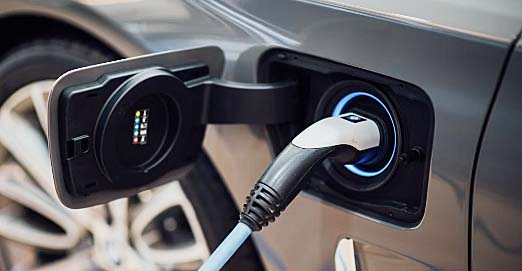Despite the Biden administration promise to create a nationwide network of 500,000 electric vehicle charging stations no more than 50 miles apart on the country’s busiest highways and interstates, the U.S. has only 165,000 individual charging ports for nearly 4.2 million miles of highway as of January of 2024 (image courtesy of Unsplash).
SALT LAKE CITY – Gov. Spencer Cox joined governors of 15 other states on Jan. 22 voicing their opposition to another of President Joe Biden’s green new deal mandates to make more than 60 percent of American vehicles powered by electricity by 2032.
In a letter to Biden, the 16 governors acknowledged that battery electric vehicles are a promising technology, but warned that it will take time to develop the market for electric vehicles and the infrastructure to recharge them.
Rather than using government mandates to drive the vehicle market, the governors urged Biden to allow American consumers “to maintain choice in the types of vehicles they choose to drive.”
“Even with deep price cuts, manufacturer’s incentives and generous government funding,” they said, “federal mandates on electric vehicles are unrealistic.
“The American consumer should be able to decide what technology makes the most sense for them, not the federal government,” the governors bluntly added.
Without federal coercion, it remains to be seen whether Americans will make the transition to electric vehicles at all, much less by 2032.
In April of 2023, the Biden administration proposed that two of every three new vehicles produced in the United States during model years 2027 to 2032 be battery powered.
That mandate would apply to light-duty passenger cars, according to officials of the Environmental Protection Agency. For medium-duty vehicles, the share of new sales that are electric could be 46 percent.
The EPA additionally proposed new climate regulations for heavy-duty vehicles including delivery trucks and school buses.
The federal bureaucrats would not mandate this level of electric vehicle sales, but would require that automakers limit the greenhouse gas emissions coming from their respective fleets, thereby forcing the industry to make more electric vehicles.
Whether they liked it or not, consumers who wanted a new car would then be obliged to enter the electric vehicle market due to the lack of available alternatives. The real problem with electric vehicles, the governors insist, is that they’re simply not ready for prime time.
When the new EPA regulations were announced in 2023, the Biden administration boasted that sales of battery electric vehicles had tripled in recent years. But automotive industry representatives report that of the 250 million sedans, light-duty trucks and sports utility vehicles sold in 2023, less than 1 percent were electric powered.
In their letter to Biden, the 16 governors say that there are a number of reasons why consumers are leaving electric powered cars on dealership lots. Those include short-range; higher initial purchase prices; high cost of battery replacement; electrical system/software issues; and, lack of battery charging facilities.
That latter concern is also a major problem, according to the governors.
When Congress passed the $1 trillion Bipartisan Infrastructure Law in 2021, the White House promised to grow a nationwide network of 500,000 electric vehicle chargers no more than 50 miles apart on the country’s busiest highways and interstates.
Due to thorny technical problems, however, the first of those charging stations did not come online until December of 2023 in Ohio.
As of January 2024, the U.S. has 165,000 individual charging ports for nearly 4.2 million miles of highway.
“Just this summer,” the governors reminded Biden, “we saw the challenges associated with electric vehicles when your own secretary of Energy (Jennifer Granholm) and her staff got caught up in a altercation at a charging station while attempting to reserve one of the limited charging ports for the secretary’s electric vehicle.”
The president’s mandate also glosses over national security and strategic considerations, according to Cox and the other governors.
Given China’s current preeminent position in terms of global battery production and mining of critical elements – estimated at 70 percent of both — the governors argued that mandating a transition to electric vehicles too quickly represents a national security risk.
The governors also expressed concern about the U.S. electrical grid’s capacity and reliability to charge millions of new electric vehicles, given that the Biden administration bureaucrats also appear intent on shutting-down coal-fired power plants nationwide.
The letter to Biden dated Jan. 22 was signed by Cox and Governors Sarah Sanders of Arkansas, Jeff Landry of Louisiana, Jim Pillen of Nebraska, Doug Burgum of North Dakota, Greg Abbott of Texas, Mark Gordon of Wyoming, Brad Little of Idaho, Mike Parson of Missouri, Joe Lombardo of Nevada, Kevin Stitt of Oklahoma, Kim Reynolds of Iowa, Greg Gianforte of Montana, Chris Sununu of New Hampshire, Kristi Noem of South Dakota and Glenn Youngkin of Virginia.
“Your mandates are unrealistic, costly and prescriptive solutions that harm American consumers,” the governors stated flatly.
“We request that you remove your mandate that two of every three vehicles be electric (by 2032) and instead provide a more realistic approach by allowing the free market to determine the direction and timing for the industry’s growth rather than the federal government.”

